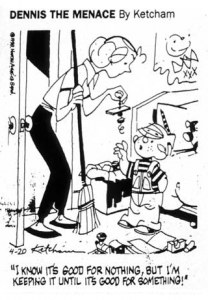 As professional organizer I hear people label themselves especially when they call for help. Usually this occurs while doing an assessment on the phone. Often, the person calling states or describes themselves as a hoarder. My opinion is that, due to reality shows like Hoarders or Buried Alive, people seem to identify themselves from what they see on t.v. People use this label even when they aren’t a hoarder. It’s become a generic label that people use falsely to describe themselves. These days, what you see or hear in the media soon become buzz words used by many. In times prior to reality shows these people may have called themselves pack-rats. They may be defined as people who gather, accumulate, store quantities of items for too long — for many “meaningful” reasons. Generally, hoarding behaviors fall under the category of chronic disorganization.
As professional organizer I hear people label themselves especially when they call for help. Usually this occurs while doing an assessment on the phone. Often, the person calling states or describes themselves as a hoarder. My opinion is that, due to reality shows like Hoarders or Buried Alive, people seem to identify themselves from what they see on t.v. People use this label even when they aren’t a hoarder. It’s become a generic label that people use falsely to describe themselves. These days, what you see or hear in the media soon become buzz words used by many. In times prior to reality shows these people may have called themselves pack-rats. They may be defined as people who gather, accumulate, store quantities of items for too long — for many “meaningful” reasons. Generally, hoarding behaviors fall under the category of chronic disorganization.
With my 10 years of “hands on” experience and educational classes on chronic disorganization, my definition of hoarding is this: Hoarders are people who are emotionally attached to their things and gather excessively beyond the norm. This includes trash as defined as items soiled, damaged, expired, unhealthy, worthless, or nonsensical. They place a higher value on these items and sometimes have irrational reasons why they hold on to them. They will acquire and put themselves in harms way in order to keep these items in their physical space. They will choose to give up all support and interaction with other human beings. What they acquire and choose to keep — become and are — their prized possessions. They will jeopardize their own safety in order to keep these possessions. They can live in filth and squalor. They endanger themselves and the dwelling’s structure and home’s safety. In extreme cases they will become homeless in order to hold onto their prized accumulations.
Hoarding is a clinical term now recognized by the American Psychological Association and is included in their Diagnostic and Statistical Manual (DSM). In the current edition, DSM-V, this disorder, Hoarding is newly defined. After so many years, hoarding is now being studied, researched, and evaluated individually. It also can coexist with several mental disorders and diseases.
Professional Organizers ask pertinent questions when doing an assessment so we can best serve the individuals. We do not judge people, and quite often find people use the “hoarding” term too broadly and too often.This is so sad, CLUTTER will make anyone feel unhappy.
Labeling yourself can be self defeating. Labels can help identify and create awareness for change. But labeling yourself as a hoarder can ultimately give you a negative self image. It will dis-empower you; its negative connotations will not forward your growth or the process. Support is important, especially if you feel like your living space is out of control. Please get assistance either from a healthcare professional, your physician, a professional organizer specializing in chronic disorganization, or from all 3 sources. The key is awareness, getting help, and taking action!
The Institute for Challenging Disorganization offers this:
“Chronic disorganization is having a past history of disorganization in which self-help efforts to change have failed, an undermining of current quality of life due to disorganization, and the expectation of future disorganization.
FOR MORE INFO, please check out this link: http://www.challengingdisorganization.org/
“We can’t solve problems by using the same kind of thinking we used when we created them” — Albert Einstein





Good article about a term used way too often.